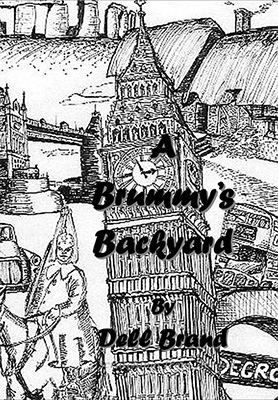WYLDE OATES
First Chapter

Chapter 1
New Lanark, 1810
A too-small overcoat hugged the slim frame of the boy as he stood respectfully with cap in hand, his eyes on his scuffed boots. He knew that the next few seconds would seal the fate of his family. He had left them waiting in his village while he had hiked the six miles to New Lanark in the hope of obtaining work.
‘Can I help you, lad?’
The boy raised his head.
The man took in the slight build, the clean hands and face and the boy’s steel-grey eyes that gazed up at him from beneath a mop of dark curly hair and prominent forehead. He saw grit and determination in the boy’s gaze along with desperation and decided to make it easier on him. ‘I’m guessing you want a job?’
Perhaps the long walk had not been in vain. Wanting to believe it was kindness reflected in the man’s voice, the boy answered. ‘Yes, sir.’
‘What’s your name, boy?’
‘Tom, sir. Tom Wylde.’
‘Well, Tom, could you tell me a little about yourself?’
The boy began hesitantly, not sure what was required but, under gentle probing, his story gradually spilled out.
For generations past, his family had been cottars on Lord Selkirk’s estate but now conditions had changed. Under ‘the improvements’ the Earl had made, his da had been unable to meet the inflated rent on their small holding and so had been moved to a cottage in the village of Carluke. He had found work in a Glasgow mill though was retained by the earl to assist at lambing and harvest times. However he was temporarily unable to work with a badly-infected leg. Tom concluded his story with the pronouncement that he was willing to do whatever job he was given in order to help feed his four younger siblings.
‘I see. And you walked here this morning?’
Tom frowned for the answer was obvious. ‘Yes, sir.’
‘Can you read and write?’
‘Yes, sir, I can write a little and read words.’
‘And why would you be wanting to work here? Surely your father could have secured you a job in the mill where he works?’
‘My ma heard that you are a decent mill owner, sir.’
The man nodded, considering what Tom had left unsaid and liking him the more for it.
For his part, Tom was feeling a little more comfortable in this man’s presence. So far he had not been shown the door, hence there was the chance of a job. Tom hoped he was speaking with the owner of the mill, the man who had the authority to hire him. Conscious of his poor clothing, he sensed the man before him was prosperous for he was dressed in fine clothes. A tartan waistcoat of wool hugged his slim body and covered a white linen shirt while white stockings rose from sturdy boots and travelled over strong calves to meet buckskin-coloured breeches. The whole outfit spoke of wealth yet practicality.
‘Do you know who I am, Tom?’
‘No, sir, though I believe you may be the owner of the mill.’
‘Yes, that’s right. I’m Mr. Owen.’
Robert Owen liked what he was seeing in Tom. He sensed there was a depth to him, a quality which stood him apart. For sure there had been countless boys before him. His father-in-law, when he had been in charge of the mill, had employed hundreds of children gleaned from the city orphanages and Owen still had many of these on the payroll. Nor was Tom’s story any different to countless he’d heard before.
Times were changing in Scotland, in fact in the whole of Britain, and families such as Tom’s were all casualties of the agricultural revolution. The change from tenant farming to large-scale sheep-rearing and grain-growing in the Borders region required far less manpower and it was a sad fact of life that hundreds of cottars were now superfluous to need and had become an on-going problem for the large estates. Some had been re-located to purpose-built villages like Tom’s where they rented a cottage from their laird but most had been forced to seek lodgings and work in the emerging industrial centres of Glasgow and Edinburgh or the towns of northern England. Yet these solutions were not meeting the entire problem and there were growing moves afoot to re-settle thousands in the New World.
‘Are you a hard worker, Tom?’
‘Yes, sir. I am used to hard work and long hours.’
‘If you were to work for me, I would require you to live here on site and work six days a week from seven in the morning till seven in the afternoon and attend school each night from seven-thirty to nine to improve your mind. Your work clothes would be provided and I would pay you in cash at the end of each week. You would be free to go home on Sundays to attend church and visit your family. Do you think you could manage all that?’
‘Yes, sir.’
‘Carluke, you said. That’s another twelve miles of walking if you were to begin tomorrow morning.’
‘Yes, sir. I can do it.’
It was the answer Owen wanted to hear. He nodded. ‘Very well. I shall give you a trial. And I will pay you two days’ wage in advance so you have something to take home to your family. Go home with the money and return this afternoon with your belongings. By that time I will have arranged your lodging and work clothes to be ready. You will begin tomorrow.’
‘Thank you, sir.’
Tom left the mill at a run, not at all daunted by the miles in front of him, eager to share the wonderful news with his family. The coins in his pocket were more than enough for his mother to buy food to tide them over for a few days.
He was fortunate to cadge a lift on a dray going towards Glasgow so was home in less than two hours. When nearing his village, he considered calling to see their close friends, the Oates, and telling them he had secured a job. Mr. Oates most likely would be out working with the estate sheep but a short visit would mean seeing Isabella.
Tom was sweet on the Oates’ eldest, a girl of twelve whom everyone called Bella, though he had not spoken of this to anyone, least of all her. He considered her the bonniest of lasses with her bright red hair that was always firmly plastered to the top of her head in plaits, her almost-white skin and her laughing green eyes brimful with mischief. But afraid of being teased by older boys or even by his own father, he had remained silent, admiring her in secret. At fourteen he was still unsure of himself.
He decided against the neighbourly visit, too eager to share his good fortune and spend time with his family before returning to the mill.
‘Ma, Da, I have a job! I’m to return this afternoon and begin tomorrow and, look, Mr. Owen gave me two days’ wage in advance so you can buy some food, Ma.’
His mother’s face broke into a wide smile as she hugged her oldest son, clasping the proffered coins tightly. ‘This is indeed an answer to prayer, Tom. We must thank God tonight for his providence.’ She was delighted that her suggestion to try the New Lanark cotton mill had been the right one. Robert Owen had a growing reputation for benevolence and his mill was a sought-after place of employment. Though his wages were lower than those of the Glasgow mills, there were additional benefits for his workers. Others in Carluke had found work at New Lanark and their reports were always positive.
‘What we have heard is true then,’ remarked his da. ‘Mr. Owen is indeed a good man.’
Tom nodded. ‘He is a very nice man, Da. He took time to talk to me and wanted to know all about us.’
Sometime later, after giving his parents and siblings a final hug, he left with his father’s blessing and his mother’s admonition.
‘Now you watch that temper of yours, young Tom. Don’t let it ruin your chances with this job. Always count to ten before you respond.’
‘Yes, Ma, I’ll remember.’
First crossing the fields near Carluke on well-used footpaths then following the road south towards Lanark, he eventually passed through the town for the third time that day, arriving at the mill in the late afternoon. With his few possessions tied in a spare shirt and slung over his shoulder, he admitted to being a little footsore but was still riding high on a tide of excitement.
He waited at the spot Mr. Owen had indicated that morning, his mind darting from one glorious possibility to the next, imagining his future over the coming years.
Eventually an older woman bustled up to him. Introducing herself as Mrs. Duncan, she led Tom to a long building. ‘This’ll be your home from now on, Tom Wylde. Mill Number Four. It’s a storeroom and workshop below with a boys’ dormitory on top.’
They climbed four flights of stairs to a long, low-ceilinged attic holding rows of double bunks, each set alongside a small window.
‘That one’ll be yourn,’ she continued, pointing to an upper bunk on the right-hand side. ‘Number twenty-eight. And that box there too.’ She pointed to an empty box at the end of the bunks also numbered twenty-eight. ‘Once you have changed your clothes and put your belongings in the box, you can slide it under the bed. When you’re done, make yourself scarce for an hour or so. The gong’ll go for supper at five-thirty and it’s served downstairs. You’ll be free tonight as it’s Sunday with no night school. That’ll start for you tomorrow. But t’other boys’ll show you what’s what.’
‘Thank you, Mrs. Duncan.’
Tom changed into the set of blue work clothes that had been laid out for him and placed his scant belongings in the box, pushing it under the bed as Mrs. Duncan had instructed. Pausing to peep out the tiny window of his new abode, excitement enveloped him again, his mind flitting momentarily to Bella. He was now a worker earning a wage, supporting his family and well on his way to being considered a man. His future with the love of his life was one step closer.
His window gave a view of the main buildings of the mill, most of which fronted the Clyde River. He knew that the river powered the machinery but that was the extent of his knowledge and he was eager to learn everything he could about cotton milling.
As the afternoon remained pleasantly sunny, he decided his free hour should be spent exploring both the grounds of the mill and the riverbank. After descending the stairs he let himself out the main door onto a cobblestoned road. To his right was the fine house belonging to Mr. Owen where he had been interviewed that morning. Crossing the road, he strolled towards the river, stopping to peer into one of the large and silent buildings of the mill. What he saw amazed him. Expecting to see rows of individual spinning jennies, the enormity and complexity of the machinery awed him. One machine appeared to take up the entire floor. He couldn’t wait to begin work and learn how bundles of raw cotton were turned into cotton thread.
Down by the river, other boys were enjoying the free afternoon, some lying in the grass, others playing, while a few were dangling a fishing line in the fast-flowing waters. Tom spoke to no one.
Returning to his room, he was sitting on his bed when three other boys came in and flopped down on the bunks closest to his. One of them, an older lad, Tom remembered from his schooldays in Carluke. Donald Humphries had been a bully at school, frequently giving him and his friends a hard time. From his tone of voice now and the way the other two responded to him, Tom determined that nothing much had changed.
Humphries lay down on the bed directly under Tom’s but not before his eyes had narrowed at the sight of the newcomer, his mind ticking over as he tried to place him. He remembered the face from somewhere and was confident the memory eventually would surface.
Tom did not let on, giving him a curt nod before turning to the other two. These boys gave him a cheery greeting and introduced themselves as brothers from Glasgow. Gus and Andrew invited him to join them for supper.
The three younger lads sat together at a table in the dining hall while Don distanced himself by sitting elsewhere. The brothers were happy to have Tom join their little group and introduced him to the others at their table.
‘You’ll start as a scavenger,’ Gus informed him as they tucked into the thick beef and barley stew and bread before them. ‘Everybody starts there. It’s only after you’ve proved yourself that you will go on to better work.’
‘That is if you’re still alive,’ added Gus. ‘Plenty of scavengers go out of here in a box.’
‘He’s exaggeratin’,’ explained Andrew, ‘though a few have died. Tis dangerous work and the smaller you are the better.’
Tom frowned so Andrew continued. ‘A scavenger has to crawl under the movin’ parts of the machinery to collect the cotton fluff buildin’ up. Because the machinery is workin’, it’s easy to injure yourself if you lift you head or catch your clothes. But you mayn’t start there. There’s already smaller kids who do that and you’re too tall anyway. My guess is you’ll start as a scutcher or a piecer.’
Andrew was proved correct. The following morning Tom was taken to the plant where his new friends worked and introduced to the overlooker, the man whose job it was to keep the floor working smoothly. This man took him down to a long room below the machinery where all activity was concentrated at one end. Hundreds of bags were stacked along the wall and rows of women and younger children stood at long tables while other women nearer the bags banged on racks with sticks. At the other end of the room, tradesmen and mechanics were busily building and installing new machinery which Tom would soon learn were scutching machines or ‘lintmills’.
Until these were up and running, scutching at New Lanark would continue to be done by hand. Tom watched as two buxom women manhandled a bag of cotton seed pods, called bolls, onto one of the mesh racks. The overlooker introduced him to a woman called Kate before leaving him to return upstairs.
Kate directed him to start straightaway, helping to spread out the pods. She handed him a heavy stick and told him to beat the bolls with it, a process she called ‘willowing’. Once they were sufficiently ruptured, Tom was directed to gather them up and pass them over to one of the long tables where women and children were engaged in separating the tufts of thin cotton fibres from the husks and seeds. The good ‘lap’, as it was called, went into bags ready for the next part of the process while the husks and seeds were discarded.
Tom spent the first week alternating between shaking out bags onto the mesh, willowing the pods and working at the tables. Initially his arms and shoulders rebelled under the relentless heavy work and he looked forward to the relative ease of working at the tables though the rough outer casings of the cotton bolls caused the skin on his hands to split and bleed. Kate showed him how to wrap strips of linen around his fingers to prevent his blood staining the cotton.
For the first week he could barely move his arms by nightfall and found it difficult to even hold his quill when he attended the compulsory night classes. But gradually as the weeks passed his hands toughened and his arms strengthened. He became accustomed to the heavy work and spent more time willowing than separating. Though the work was repetitive and tedious, Tom attacked it with diligence, knowing that he had already proved himself a hard worker and that his weekly pay packet was helping to feed his family.
When the new scutching machines were operational, Tom was amongst the first workers to use them for the man in charge of the scutching had noted that he was both hard-working and quick to pick up new skills. Tom learned quickly how to operate the water-powered machines, manoeuvring around their little quirks and able to repair minor breakdowns to keep them operating.
The sole shadow across his new existence was the vague threat posed by Don Humphries. Despite Tom’s best efforts to avoid him, occasional meetings were inevitable and every time Humphries was prepared with a sharp word. One night, on the walk back to the dormitory from night school, the older boy ambushed him.
‘I’ve remembered you now, Wylde. You’re one of them filthy cottars the Earl gave a cottage to at Carluke.’
Tom didn’t answer which made Humphries pursue him further. ‘Where’s your manners, boy? I’m speaking to you.’
Tom could feel his temper rising but wanted to avoid any sort of altercation. He remembered his mother’s words and counted to ten. ‘I have nothing to say to you, Humphries. Leave me alone.’
But Humphries could smell some sport. ‘Trying to come up in the world, are you, Wylde? Trying to do better than your da, useless piece of shit he is.’
‘You leave my da out of this, Humphries.’
‘Why? What will you do about it?’
Tom swung his fist at the older boy’s face and missed.
Humphries laughed. ‘You’ll have to do better than that, Wylde. Come on, have another go.’
Tom ran at him, colliding with his chest and causing him to stumble and nearly fall.
‘You little shit!’ Humphries swung at Tom and connected with his chin, sending him sprawling onto the cobblestones.
By the time Tom had calmed, Humphries had gone. He returned to the darkened dormitory and could see Humphries already in bed facing the wall, his two friends quiet and still. He climbed up into his bunk and stared into the darkness, considering what had happened, knowing he had to take more control of his temper. He had washed his face and hands at the water pump and, although his chin was sore, there was no serious damage. Mr. Owen had made it clear that he did not tolerate fighting in his mill so he hoped no one would notice his face tomorrow.
He would have to find ways of avoiding Don Humphries. His job was too important and his dreams of improvement, of moving up to more interesting work in the mill, would be under threat if he allowed that bully to goad him again. He vowed to do better. Somehow he would have to keep away from Humphries. But he had no idea how to go about it.







